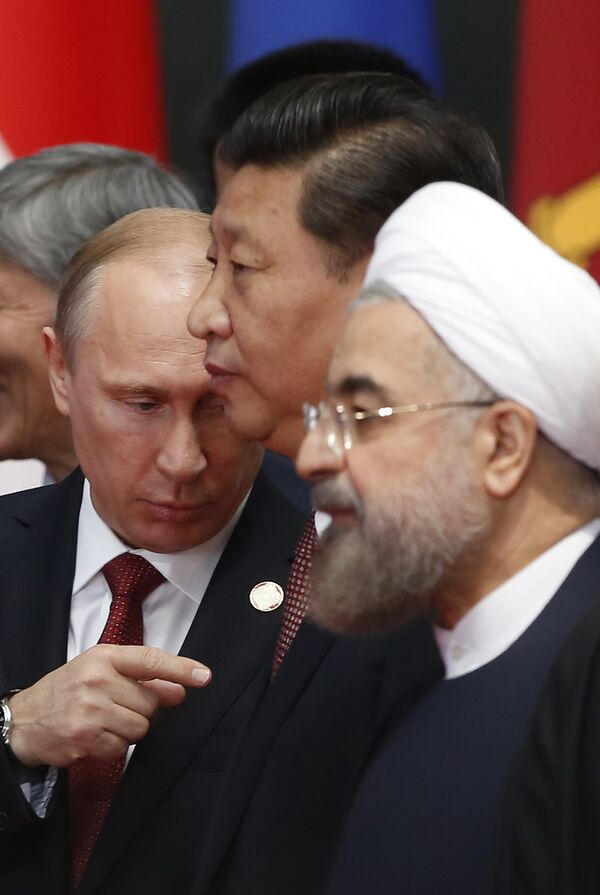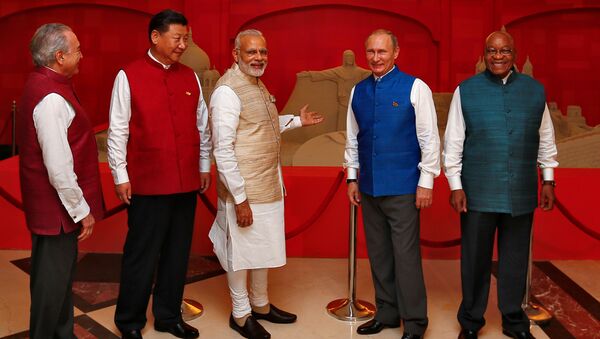The strategic alliance of Moscow and Beijing, which took its final shape in 2012-2014, is based on common interests and goals; one of its aims is to create a new global order that will eventually replace the so-called "Pax Americana," Russian online newpaper Vzglyad says.
Commenting on the possible consequences of Donald Trump's victory in the US presidential election, Petr Akopov of Vzglyad posed the question whether there are any preconditions for a progressive Russo-American rapprochement.
According to Akopov, even if Trump reaches an agreement with Russia on a joint military operation against Daesh (ISIS/ISIL) in Syria, de-escalates tensions over Ukraine (providing guarantees that the latter would not join NATO), lifts some of the sanctions on Moscow and allows Europe to restore its ties with Russia, there will still be a number of geopolitical contradictions between Moscow and Washington.
However, it is possible that Washington's foreign policy doctrine will undergo some changes which could lead to the re-formatting of NATO, accelerating the "circulation of elites" in Europe and provoking the transformation of the EU.
"In general, it is in Trump's style to propose a 'big deal' to Moscow in order to reach a comprehensive agreement on a global scale. While under Barack Obama the US offered China to create a 'big two' to solve the global issues together, Trump could now try to make a similar offer (albeit informally) to Russia," Akopov assumes.
"However, China had not bought into it and likewise Russia won't change its foreign strategy because of the US's foreign policy shift," he deems.
Indeed, as Russian military experts Vasily Kashin suggested in his interview with Sputnik, the US is likely to switch its focus from Eastern Europe and the Middle East to Asia-Pacific.
According to the military expert, Washington under Trump will seek to strike a mutually acceptable compromise with Russia; after having its hands untied the US will increase its pressure on China, America's major economic and political rival.
"Imagine that Trump starts a trade war with Beijing, as he promised, while continuing to conduct the policy of military containment toward China… In the eyes of Beijing these actions coupled with Washington's activity in the South China Sea, the Korean peninsula, Japan and Taiwan would look like an 'offensive' [against China]. Under these circumstances it is unlikely that Russia would remain a neutral and passive observer," Akopov writes.
Iran may become yet another apple of discord between Moscow and Washington, he continues.

While it is obvious that Trump won't tear up the Iran nuclear deal, Washington's potential attempts to exert further pressure on Tehran would be negatively perceived by both Moscow and Beijing, the journalist suggests.
"Russia and China need Iran as their strategic partner, in half a year Tehran will join the Shanghai Cooperation Organization (SCO)," the journalist reminds, adding that Moscow and Beijing will not leave their ally in the lurch.
The journalist highlights that Moscow and Beijing are taking efforts to create a multi-polar world based on the principles of equality and mutual respect, where the United States will be just one of the centers of power.
The opinion piece published in Vzglyad echoes the People's Daily, China's leading media outlet, recent report.
"The closeness between China and Russia is determined by several factors, formed over a long period of time; it brings stable strategic benefits to both countries," the People's Daily said Wednesday.
"We believe that the leaders of both countries [Russia and China] as well as their diplomatic elite would protect the status quo established jointly by China and Russia," the media wrote adding that "Russia will not sacrifice the Sino-Russian relationship for the development of Russian-American relations."
In light of this the potential US-Russian thaw will by no means harm China's interests, according to the Chinese media outlet.




